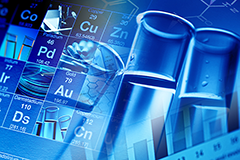
CHEMISTRY CLASS 2
Video-Based, Self-Paced, Teacher-Supported Online High School Education
Welcome to Silicon Valley High School, where we offer a unique high school experience tailored for the Internet generation. We provide a wide range of online education courses, including our renowned online chemistry courses, among our extensive catalog of over 55 online courses.
Price: $125 | Credits: 5 | Dept: Science | Course ID# 261-2
Our online General Chemistry course is designed to fulfil the high school chemistry curriculum requirements for grades 9-12. With a comprehensive approach, this course encompasses theoretical knowledge and practical research components, setting it apart as one of the finest fully online general chemistry courses. Our course offers a comprehensive understanding of the subject by exploring essential topics such as stoichiometry, limiting reagents, percentage yield, solutions, solubility, acids and bases, gas behaviour, chemical equilibrium, nuclear chemistry, and organic chemistry. Recognized by the University of California A-G, this Chemistry course holds an experimental discipline status within category D, reflecting its innovative and dynamic nature. Enroll today to embark on a transformative educational journey in chemistry.
Laboratory Science
To meet the University of California A-G chemistry course requirements, students must complete two essential components: an online chemistry course and a hands-on wet chemistry lab. Our comprehensive online chemistry course encompasses the full curriculum, offering a dynamic learning experience through engaging videos, interactive quizzes, stimulating assignments, research projects, and a comprehensive final exam at the end of each semester. It is important to highlight that the lab kit necessary for the wet chemistry lab is not included in the course and must be acquired separately, ensuring students have the materials required to conduct the practical experiments.
Please note that the Laboratory Kit, an essential companion for this course, is not included and must be acquired separately.
To enhance your learning experience, a specially curated laboratory kit is available for purchase through Quality Science Labs . This kit, meticulously designed by SVHS and Quality Science Labs , is tailored specifically for this science course. Conveniently, if you have already gotten the kit for Chemistry Part 1, it can be used for Chemistry Part 2, so you won’t need to purchase an additional kit. As a valued student enrolled in the chemistry program, you will have access to a customer code provided within the course, granting you a discount on the lab kit. Acquire the kit from Quality Science Labs and enjoy the convenience of having it delivered directly to your doorstep by mail.
Lab Details and Descriptions
The laboratory package comprises detailed instructions for the hands-on experiments. A brief overview of the data lab sessions covered in this online course can be accessed by clicking here.
Credit & Study hours
Upon completing this course, the learner will be awarded 5 credits, with each credit equivalent to 15 hours of dedicated learning. However, since every student engages with the course at their own pace and has unique schedules, some students may quickly complete the learning process by investing additional study hours.
Chemistry Class 2 Course
Video-Based, Self-Paced And Teacher-Supported

Course Details
- 5 Credits – $125
- First semester of Chemistry
Approvals:
ACCREDITED BY:

Video-Based
Our chemistry class 2 curriculum is designed to cater to the preferences of many students who find watching videos more appealing than reading textbooks. It is a video-based curriculum, thoughtfully designed with captivating video content that not only informs but also entertains students, making their learning experience engaging and enjoyable. This course content is specifically tailored to our chemistry class 2 courses, providing students with comprehensive resources to enhance their understanding and mastery of the subject.

Self-Paced
Courses are structured to be self-paced, allowing students to tailor their learning experience to fit their individual schedules. We understand that some students thrive when working outside the confines of traditional school hours, and they have the flexibility to study at their preferred time and pace. To assist students in managing their progress, each course is accompanied by a timeline and additional resources, empowering them to effectively pace themselves throughout the course.

Teacher-Supported
Students enrolled in online classes have the advantage of having their assignments evaluated and receiving valuable feedback from qualified teachers. In addition, students can conveniently submit their questions online and receive prompt responses from their teachers via email. For further support and personalized guidance, students also have the option to schedule one-on-one classes or engage in videoconference-based tutoring sessions specifically tailored to their digital courses.


LEARNING OBJECTIVES
During this module, students will acquire a solid understanding of basic chemistry concepts and physic concepts. They will delve into the intricacies of fundamental concepts within the realms of basic chemistry and physics, expanding their comprehension and knowledge in these areas of study. This will empower them with valuable chemistry knowledge, enabling them to make connections and further enhance their overall understanding of the subject matter.
The significance of coefficients in a balanced equation, molar ratios, mole-mole calculations, mass-mass calculations and other stoichiometric calculations.
To solve Limiting Reactant stoichiometry problems as well as how to determine the excess reactant.
The difference and the basic principles between actual, theoretical and percent yields with examples of how to calculate theoretical and percent yields.
The concepts of solutions and solubility. The chemical structure of water, and why water is so important for life.
How and why water acts as a wonderful solvent and provides a medium for metabolism.
The various factors that affect how well a solid-liquid solute dissolves, including Particle Size, Temperature, Agitation and the Chemical Nature of the solute, particularly polarity (Like dissolves like.)
To interpret solubility curves and read solubility curves.
To identify and understand saturated, unsaturated and supersaturated solutions.
Colligative properties, freezing point depression and boiling point elevation.
The relationship between amount of solute and degree of freezing point depression-boiling point elevation.
The general properties of acids and bases. Including the Arrhenius definitions for acids and bases. Bronsted and Lowry’s theory of acids and bases.
To distinguish between strong and weak acids and bases in terms of the extent of dissociation, reaction with water and electrical conductivity.
The pH scale and to consider the effects of acid deposition on limestone buildings and living things.To understand the nature of a strong acid and a strong base. To solve acid-base titration math problems.
The nature of gases as related to Chemistry studies.
The assumptions behind the Kinetic Molecular Theory and some general properties of gases from a molecular perspective. Avogadro’s Law, Boyle’s Law, Lussac’s Law and Charles’ law.
Understanding how the ideal gas equation allows one to find the pressure, volume, temperature and/or number of moles in a certain situation.
To measure and consider the rate of a reaction.
The connection between concentration and reaction rate in terms of the Law of Mass Action and Rate Laws.
The equilibrium constant (K,) and how it can be calculated in various reversible reactions. Le Chatelier’s Principle and how it predicts changes in concentration when “stressing” reactions at equilibrium.
Nuclear and atomic structure and stability, radioactive decay, and nuclear energy. As well as, the biological effects of radiation as well as technology related to energy, medicine, geology, and other areas.
Organic chemistry – why the element carbon results in such a variety of compounds, how those compounds are classified, and the role of organic compounds in biology and industry.
TOPICS COVERED IN THE CHEMISTRY CLASS 2 COURSE
This course covers an introduction to the following subject topics:
Quantities in Chemical Reactions
Solutions and Solubility
Acids and Bases
Gases
Chemical Equilibrium
Nuclear Chemistry
Organic Chemistry
Inorganic Chemistry
Physical Chemistry
Periodic Table and elements
Matter, Atoms and Molecules
Thermodynamics
SIGN UP NOW FOR CHEMISTRY CLASS
Enroll now for our Credit Recovery High School online courses and take advantage of the flexibility they offer. Our courses are accessible 24/7, 365 days a year, allowing you to sign up at your convenience. At SVHS, we prioritize your flexibility and learning experience by eliminating strict due dates and deadlines. You have the freedom to work through your classes at a time that best suits your schedule. Don’t wait any longer, sign up now.
QUESTIONS ABOUT THE CHEMISTRY COURSES?
To access more information about our courses, you can click on the FAQ (frequently asked questions) link located at the bottom of the web page. When engaging in the chat, kindly specify that you are inquiring about our Chemistry Class 2, including our specialized courses, to learn more. We are here to assist you and cater to your demand, providing you with the necessary resources and support for your educational journey.

Course Details
- 5 Credits – $125
- First semester of Chemistry
Approvals:



































